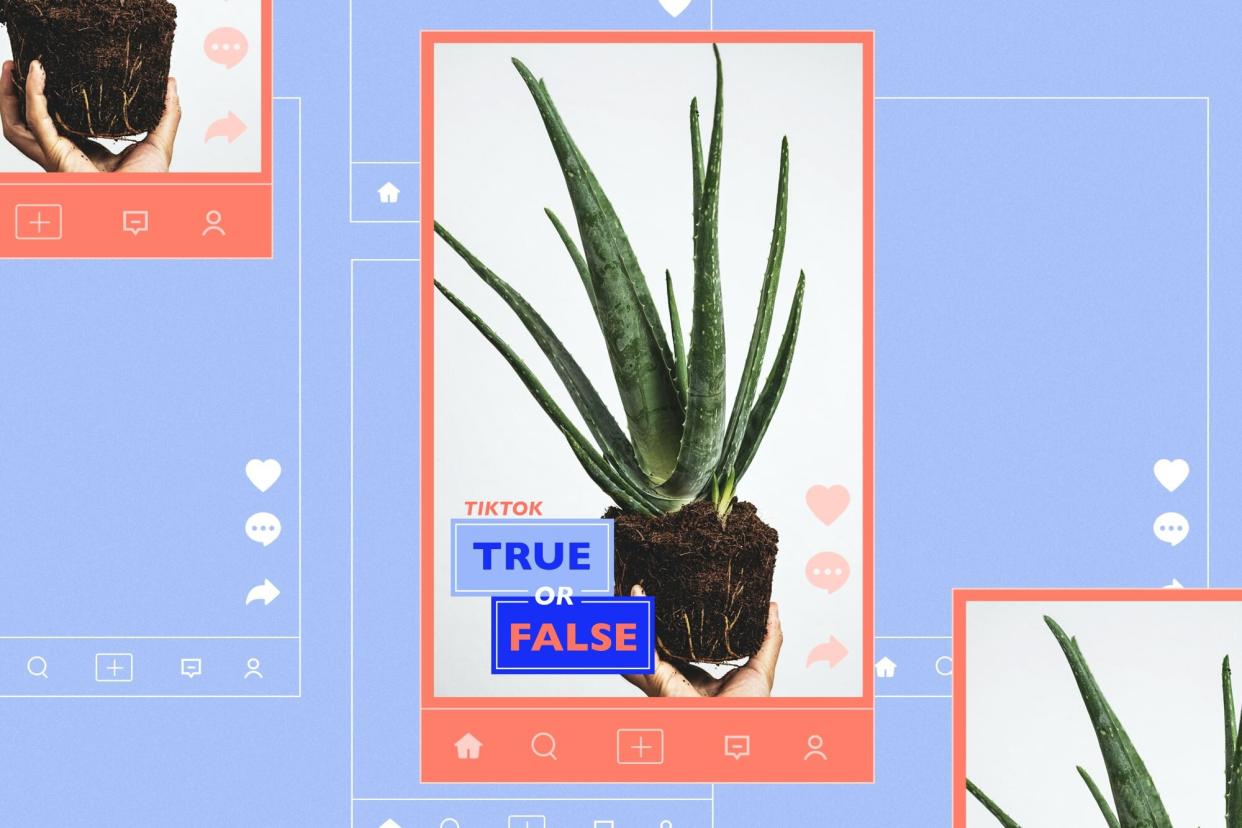TikTokers Are Drinking Aloe Vera Juice for Clear Skin, But Here's What Dermatologists Think

TABLE OF CONTENTS
On This Page
What is aloe vera?
What is aloe vera juice?
Does drinking aloe vera juice for clear skin work?
Is drinking aloe vera juice for skin safe?
Drinking aloe vera juice promotes clear skin: true or false?
Whether you have acne-prone skin or experience a few hormonal breakouts during your period, maintaining a clear and smooth complexion can take a lot of trial and error. If you're on TikTok, though, chances are you've caught wind of a viral trend that supposedly helps with acne, which involves drinking a shot of aloe vera juice in the morning and at night. Rumor has it that drinking aloe vera juice can help with breakouts and promote an overall glowing complexion and a smooth skin texture. Sounds too good to be true, right?
One of the most popular videos depicting the trend comes from TikToker Bria Lemirande, who claims she drinks an ounce of aloe vera juice morning and night to help with her skin. "I don't have the beauty filter on right now, and my skin was really broken out just last week, and it's cleared up a ton since then," she says in the clip.
Since it was posted in March 2022, Lemirande's video has racked up one million likes and more than five million views. Additionally, a search for the hashtag #aloeverajuice on the app displays videos with more than 19 million total views, including clips of other TikTokers sharing their positive experiences with drinking aloe vera juice.
While the benefits of this TikTok trend are enticing, the truth is, studies about drinking aloe vera juice for skin are extremely limited. Ahead, dermatologists explain the potential benefits and side effects of drinking aloe vera juice. Spoiler alert: It's way more nuanced than the viral TikTok videos would have you believe.
What is aloe vera?
Aloe vera is a plant that grows in dry and hot climates, according to the National Center for Complimentary and Integrative Health (NIH). Despite recent TikTok popularity surrounding aloe vera juice, the benefits of aloe vera for skin (when applied topically) are widely known, and the gel from the plant has been used as a treatment to improve skin conditions and promote wound-healing for thousands of years.
Skin-care products containing aloe vera use a gel extracted from the plant by removing the leaves, according to the Cleveland Clinic. It's easy to access and commonly used topically — you've likely heard about using aloe vera after getting a sunburn. "Its gel-like consistency makes it easy to apply and soothes the skin on application with the potential to promote wound-healing," says Erum Ilyas M.D., M.B.E., F.A.A.D., a board-certified dermatologist at Schweiger Dermatology Group in Pennsylvania.
Research also shows that topical application of aloe vera can improve acne and psoriasis (a skin condition that causes itchy, scaly skin), says Snehal Amin, M.D., F.A.A.D., co-founder and surgical director of MDCS Dermatology. "With over 75 potentially active constituents, aloe gel has an impressive range of benefits for the skin," he says. Aloe vera also contains anti-inflammatory and antioxidant properties, which are beneficial for fighting against free radical damage in the skin. (Related: The Best Psoriasis Shampoo That Won't Backfire On You)
What is aloe vera juice?
Aloe vera juice is made from the gel concentrate found when you cut aloe vera plant leaves open. Other ingredients in aloe vera juice are minimal. Typically, it contains the gel, which is diluted with water, and sometimes sweeteners are added to help counteract the naturally bitter taste from the plant.
Aloe vera juice is widely accessible in local supermarkets, and TikTokers report finding it at Whole Foods and Trader Joe's. To give you an idea of what's currently on store shelves, the juice available at Trader Joe's is made with water, organic aloe juice concentrate, and lemon concentrate.
Does drinking aloe vera juice for clear skin work?
While there are plenty of proven benefits to using aloe vera topically, whether you can reap the same results from drinking aloe vera juice isn't as clear. "There are components of aloe vera gel, in particular aloe sterols, that have been used in studies for their antioxidant effects and anti-inflammatory effects," says Dr. Ilyas. "Aloe vera juice, however, is composed of more components than just aloe sterols alone. [So,] it is difficult to say if consumption of aloe vera juice will lead to the improvement of the skin."
There is some scientific evidence to support the idea that the foods you consume can impact your skin, according to the Cleveland Clinic. In the same way that eating processed foods can contribute to inflammation and breakouts, eating foods rich in skin-benefiting nutrients, like antioxidants, may have a positive impact as well.
However, there aren't enough studies on the consumption of aloe vera juice to say it definitively helps clear skin, according to experts. "For tolerability as well as a direct impact on the skin, topical application of aloe vera gel would likely lead to better results with fewer side effects," says Dr. Ilyas.
Is drinking aloe vera juice for skin safe?
Drinking the right amount and type of aloe vera juice is considered safe, according to experts. "There are two main parts derived from the aloe plant, clear gel (also known as the pulp), and latex (aka the layer between the gel and the skin of the plant). Aloe juice made with the clear gel of the aloe plant can be safely ingested in small quantities," says Dr. Amin.
That said, there are some concerns with consuming aloe leaf extracts. "Whole leaf aloe extract can cause acute renal (aka kidney) failure and has even been linked to cancer at doses of 1 gram a day," says Dr. Amin. It's important to note the studies that have shown a link to cancer were done on animals, according to the the NIH. More research is needed to understand the impacts on human health.
Other potential side effects of drinking aloe vera juice are diarrhea, cramps, and bloating caused by too much consumption. The latex of the aloe plant contains anthraquinones, which means it can act as a laxative, according to the National Institute of Environmental Health Sciences. "Limiting consumption to the least amount necessary to avoid diarrhea and cramps would be ideal to gauge a benefit while reducing the overall risk of side effects, says Dr. Ilyas. "This volume is likely less than three ounces daily."
Some TikTokers are drinking a shot glass (one ounce) of aloe vera juice morning and night, so they are sticking by the recommended guidelines. However, it's best to consult with a doctor before incorporating aloe vera juice into your routine.
Drinking aloe vera juice promotes clear skin: true or false?

You may want to consider this trend a pass, because dermatologists can't definitively say it's a proven method to help with skin concerns, like acne, due to limited research on the subject. While there's plenty of anecdotal evidence of its benefits on TikTok, you're better off applying aloe vera topically than ingesting it in the form of juice, according to experts.
Luckily, the options of skin-care products containing aloe vera gel are endless, ranging from serums to moisturizers and face mists. Whatever you choose, consider this your friendly reminder to take TikTok trends with a grain of salt, and always make sure you're consulting with a doctor to find the best treatment for your skin concerns.

